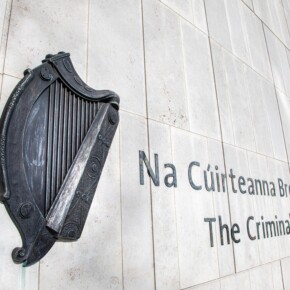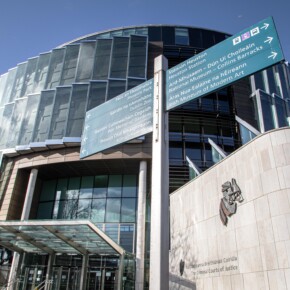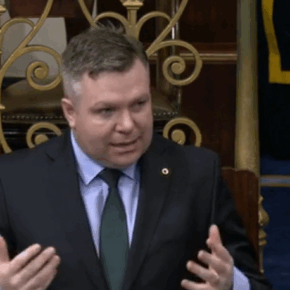Abolishing the Seanad?
Dublin People 20 Jul 2013YES, says Minister for Jobs, Enterprise and Innovation, Richard Bruton
Abolishing the Seanad would save
?¬20 million a year, reduce the number of national politicians by a third and bring us into line with every other small country in Europe.
Later this year, you will be asked whether you think this is the right thing to do, when the Government holds a Referendum to abolish the Seanad.
Ireland is the only small country in Europe with two chambers of parliament, and countries like New Zealand, Sweden, Denmark and Finland have all voted to get rid of their second house. Indeed, Ireland has 40 per cent more politicians when compared with other countries our size.
The Seanad is elected by a tiny, privileged minority; just 1 per cent of the population elected the current Seanad. And it is virtually powerless. The last time the Seanad actually rejected a piece of legislation was 50 years ago. Most of the time it just rubberstamps laws already approved by the Dáil.
According to figures supplied by the Oireachtas it costs about
?¬20 million a year to run the Seanad; so by abolishing it we would save about
?¬100 million over the course of a five-year Dáil term. That is a considerable sum of money, which could be used on other public services, like schools and hospitals.
Those who are opposing the Referendum say the Seanad should be reformed. But in its 75 years of existence, 10 reports have been published on reforming the Seanad, and very little has been done. Rather than putting another ineffective reform plan forward, we are asking a much more fundamental question: does Ireland need the Seanad?
Fianna Fáil in particular is taking a very cynical view. During the 2011 General Election, Fianna Fáil described the Seanad as
“an entity which is struggling to justify its existence
?. The Party added that the Seanad
“has ceased to be relevant over time
? and that
“it is important to note that second chambers are not an essential part of a parliamentary democracy
?.
Despite expressing these very clear views, Fianna Fáil has now done a u-turn, and is championing the retention of the Seanad. In tandem with the Referendum, the Government is improving how the Dáil works, by radically overhauling the committee system to make it more independent, and changing the way draft laws are considered to allow for greater scrutiny.
Further measures to improve our parliamentary democracy will be published shortly. I believe that the Seanad is a luxury the political system can no longer afford and that a reformed Dáil can deliver accountable Government with fewer but more effective politicians. If you agree, then I urge you to vote Yes.
NO says Averil Power, Fianna Fáil’s Seanad spokesperson on Education
It is no coincidence that the Government will hold this referendum in the run-up to a harsh Budget in October.
They want at all costs to distract attention from the impact that another harsh and unfair Budget will have on Dublin families.
Richard Bruton recently suggested that the abolition of the Seanad will save
?¬20 million a year. This figure contrasts starkly with that put forward by the Clerk of Dáil Ã?ireann, who told an Oireachtas Committee in 2012 that the true annual saving would be under
?¬10 million.
To put it in context, Seanad Ã?ireann costs each person living in Ireland just
?¬2 per year.
The Government claim that they want to close the Seanad because they are concerned about the cost of our democracy. If this is the case, why are they increasing the number of councillors in Dublin by 60 from 2014?
The reality is that abolishing the Seanad is nothing more than a power-grab.
If the Seanad is abolished, even greater power will be centralised in the Cabinet. Not having to worry about the scrutiny of a second chamber, they will be able to push through whatever laws and extra charges they want, no matter how flawed or unfair they are.
By contrast, a reformed Seanad would greatly enhance our democracy and help to ensure better quality decision making.
It is populist to say that the Seanad does nothing. In fact, even with the limited powers we have at present, Senators can and do make a difference.
Over the past two years, Senators Feargal Quinn and John Crown, for example, have brought forward important legislation that draws on their expertise in business and cancer services respectively.
As Fianna Fáil’s Seanad spokesperson on Education, I have also published bills and had amendments accepted to Government legislation to fix flaws that had not been picked up in the Dáil.
The Seanad is far from perfect, however, and is definitely in need of reform. The electoral system should be changed so that every citizen has a vote and its powers should be increased so that it can act as a more effective check on the Government and on the EU institutions.
There should be three options on the ballot paper this October – the status quo, reform and abolition. However, afraid that the people might choose reform over abolition, the Government has decided not to offer that choice. Instead, you will be asked to vote Yes or No to abolition.
A
‘No’ vote would send a clear signal to the Government that the people have seen through their attempted power grab. It would also force them to bring forward real reform proposals instead – not just of the Seanad but also of the Dáil.
Ireland needs a new and reformed politics to fix the broken system of Government that caused the economic crisis. Let’s reject this cheap political stunt and push for real reform instead.











